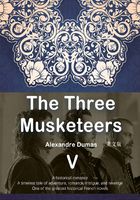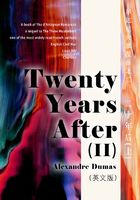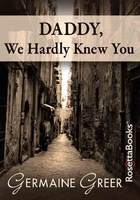At Easter—just when the heavens and earth were looking their dreariest, for Easter fell very early this year—Mr. Corbet came down. ?Mr. Wilkins was too busy to see much of him; they were together even less than usual, although not less friendly when they did meet. ?But to Ellinor the visit was one of unmixed happiness. ?Hitherto she had always had a little fear mingled up with her love of Mr. Corbet; but his manners were softened, his opinions less decided and abrupt, and his whole treatment of her showed such tenderness, that the young girl basked and revelled in it. ?One or two of their conversations had reference to their future married life in London; and she then perceived, although it did not jar against her, that her lover had not forgotten his ambition in his love. ?He tried to inoculate her with something of his own craving for success in life; but it was all in vain: she nestled to him, and told him she did not care to be the Lord Chancellor's wife—wigs and wool-sacks were not in her line; only if he wished it, she would wish it.
The last two days of his stay the weather changed. ?Sudden heat burst forth, as it does occasionally for a few hours even in our chilly English spring. ?The grey-brown bushes and trees started almost with visible progress into the tender green shade which is the forerunner of the bursting leaves. ?The sky was of full cloudless blue. ?Mr. Wilkins was to come home pretty early from the office to ride out with his daughter and her lover; but, after waiting some time for him, it grew too late, and they were obliged to give up the project. ?Nothing would serve Ellinor, then, but that she must carry out a table and have tea in the garden, on the sunny side of the tree, among the roots of which she used to play when a child. ?Miss Monro objected a little to this caprice of Ellinor's, saying that it was too early for out-of-door meals; but Mr. Corbet overruled all objections, and helped her in her gay preparations. ?She always kept to the early hours of her childhood, although she, as then, regularly sat with her father at his late dinner; and this meal al fresco was to be a reality to her and Miss Monro. ?There was a place arranged for her father, and she seized upon him as he was coming from the stable-yard, by the shrubbery path, to his study, and with merry playfulness made him a prisoner, accusing him of disappointing them of their ride, and drawing him more than half unwilling, to his chair by the table. ?But he was silent, and almost sad: his presence damped them all; they could hardly tell why, for he did not object to anything, though he seemed to enjoy nothing, and only to force a smile at Ellinor's occasional sallies. ?These became more and more rare as she perceived her father's depression. ?She watched him anxiously. ?He perceived it, and said—shivering in that strange unaccountable manner which is popularly explained by the expression that some one is passing over the earth that will one day form your grave—"Ellinor! this is not a day for out-of-door tea. ?I never felt so chilly a spot in my life. ?I cannot keep from shaking where I sit. ?I must leave this place, my dear, in spite of all your good tea."
"Oh, papa! ?I am so sorry. ?But look how full that hot sun's rays come on this turf. ?I thought I had chosen such a capital spot!"
But he got up and persisted in leaving the table, although he was evidently sorry to spoil the little party. ?He walked up and down the gravel walk, close by them, talking to them as he kept passing by and trying to cheer them up.
"Are you warmer now, papa?" asked Ellinor.
"Oh, yes! ?All right. ?It's only that place that seems so chilly and damp. ?I'm as warm as a toast now."
The next morning Mr. Corbet left them. ?The unseasonably fine weather passed away too, and all things went back to their rather grey and dreary aspect; but Ellinor was too happy to feel this much, knowing what absent love existed for her alone, and from this knowledge unconsciously trusting in the sun behind the clouds.
I have said that few or none in the immediate neighbourhood of Hamley, beside their own household and Mr. Ness, knew of Ellinor's engagement. ?At one of the rare dinner-parties to which she accompanied her father—it was at the old lady's house who chaperoned her to the assemblies—she was taken in to dinner by a young clergyman staying in the neighbourhood. ?He had just had a small living given to him in his own county, and he felt as if this was a great step in his life. ?He was good, innocent, and rather boyish in appearance. ?Ellinor was happy and at her ease, and chatted away to this Mr. Livingstone on many little points of interest which they found they had in common: church music, and the difficulty they had in getting people to sing in parts; Salisbury Cathedral, which they had both seen; styles of church architecture, Ruskin's works, and parish schools, in which Mr. Livingstone was somewhat shocked to find that Ellinor took no great interest. ?When the gentleman came in from the dining-room, it struck Ellinor, for the first time in her life, that her father had taken more wine than was good for him. ?Indeed, this had rather become a habit with him of late; but as he always tried to go quietly off to his own room when such had been the case, his daughter had never been aware of it before, and the perception of it now made her cheeks hot with shame. ?She thought that everyone must be as conscious of his altered manner and way of speaking as she was, and after a pause of sick silence, during which she could not say a word, she set to and talked to Mr. Livingstone about parish schools, anything, with redoubled vigour and apparent interest, in order to keep one or two of the company, at least, from noticing what was to her so painfully obvious.
The effect of her behaviour was far more than she had intended. ?She kept Mr. Livingstone, it is true, from observing her father, but she also riveted his attention on herself. ?He had thought her very pretty and agreeable during dinner: but after dinner he considered her bewitching, irresistible. ?He dreamed of her all night, and wakened up the next morning to a calculation of how far his income would allow him to furnish his pretty new parsonage with that crowning blessing, a wife. ?For a day or two he did up little sums, and sighed, and thought of Ellinor, her face listening with admiring interest to his sermons, her arm passed into his as they went together round the parish; her sweet voice instructing classes in his schools—turn where he would, in his imagination Ellinor's presence rose up before him.
The consequence was that he wrote an offer, which he found a far more perplexing piece of composition than a sermon; a real hearty expression of love, going on, over all obstacles, to a straightforward explanation of his present prospects and future hopes, and winding up with the information that on the succeeding morning he would call to know whether he might speak to Mr. Wilkins on the subject of this letter. ?It was given to Ellinor in the evening, as she was sitting with Miss Monro in the library. ?Mr. Wilkins was dining out, she hardly knew where, as it was a sudden engagement, of which he had sent word from the office—a gentleman's dinner-party, she supposed, as he had dressed in Hamley without coming home. ?Ellinor turned over the letter when it was brought to her, as some people do when they cannot recognise the handwriting, as if to discover from paper or seal what two moments would assure them of, if they opened the letter and looked at the signature. ?Ellinor could not guess who had written it by any outward sign; but the moment she saw the name "Herbert Livingstone," the meaning of the letter flashed upon her and she coloured all over. ?She put the letter away, unread, for a few minutes, and then made some excuse for leaving the room and going upstairs. ?When safe in her bed-chamber, she read the young man's eager words with a sense of self-reproach. ?How must she, engaged to one man, have been behaving to another, if this was the result of a single evening's interview? ?The self-reproach was unjustly bestowed; but with that we have nothing to do. ?She made herself very miserable; and at last went down with a heavy heart to go on with Dante, and rummage up words in the dictionary. ?All the time she seemed to Miss Monro to be plodding on with her Italian more diligently and sedately than usual, she was planning in her own mind to speak to her father as soon as he returned (and he had said that he should not be late), and beg him to undo the mischief she had done by seeing Mr. Livingstone the next morning, and frankly explaining the real state of affairs to him. ?But she wanted to read her letter again, and think it all over in peace; and so, at an early hour, she wished Miss Monro good-night, and went up into her own room above the drawing-room, and overlooking the flower-garden and shrubbery-path to the stable-yard, by which her father was sure to return. ?She went upstairs and studied her letter well, and tried to recall all her speeches and conduct on that miserable evening—as she thought it then—not knowing what true misery was. ?Her head ached, and she put out the candle, and went and sat on the window-seat, looking out into the moonlit garden, watching for her father. ?She opened the window; partly to cool her forehead, partly to enable her to call down softly when she should see him coming along. ?By-and-by the door from the stable-yard into the shrubbery clicked and opened, and in a moment she saw Mr. Wilkins moving through the bushes; but not alone, Mr. Dunster was with him, and the two were talking together in rather excited tones, immediately lost to hearing, however, as they entered Mr. Wilkins's study by the outer door.
"They have been dining together somewhere. ?Probably at Mr. Hanbury's" (the Hamley brewer), thought Ellinor. ?"But how provoking that he should have come home with papa this night of all nights!"
Two or three times before Mr. Dunster had called on Mr. Wilkins in the evening, as Ellinor knew; but she was not quite aware of the reason for such late visits, and had never put together the two facts—(as cause and consequence)—that on such occasions her father had been absent from the office all day, and that there might be necessary business for him to transact, the urgency of which was the motive for Mr. Dunster's visits. ?Mr. Wilkins always seemed to be annoyed by his coming at so late an hour, and spoke of it, resenting the intrusion upon his leisure; and Ellinor, without consideration, adopted her father's mode of speaking and thinking on the subject, and was rather more angry than he was whenever the obnoxious partner came on business in the evening. ?This night was, of all nights, the most ill-purposed time (so Ellinor thought) for a tête-à-tête with her father! ?However, there was no doubt in her mind as to what she had to do. ?So late as it was, the unwelcome visitor could not stop long; and then she would go down and have her little confidence with her father, and beg him to see Mr. Livingstone when he came next morning, and dismiss him as gently as might be.
She sat on in the window-seat; dreaming waking dreams of future happiness. ?She kept losing herself in such thoughts, and became almost afraid of forgetting why she sat there. ?Presently she felt cold, and got up to fetch a shawl, in which she muffled herself and resumed her place. ?It seemed to her growing very late; the moonlight was coming fuller and fuller into the garden and the blackness of the shadow was more concentrated and stronger. ?Surely Mr. Dunster could not have gone away along the dark shrubbery-path so noiselessly but what she must have heard him? ?No! there was the swell of voices coming up through the window from her father's study: angry voices they were; and her anger rose sympathetically, as she knew that her father was being irritated. ?There was a sudden movement, as of chairs pushed hastily aside, and then a mysterious unaccountable noise—heavy, sudden; and then a slight movement as of chairs again; and then a profound stillness. ?Ellinor leaned her head against the side of the window to listen more intently, for some mysterious instinct made her sick and faint. ?No sound—no noise. ?Only by-and-by she heard, what we have all heard at such times of intent listening, the beating of the pulses of her heart, and then the whirling rush of blood through her head. ?How long did this last? ?She never knew. ?By-and-by she heard her father's hurried footstep in his bedroom, next to hers; but when she ran thither to speak to him, and ask him what was amiss—if anything had been—if she might come to him now about Mr. Livingstone's letter, she found that he had gone down again to his study, and almost at the same moment she heard the little private outer door of that room open; some one went out, and then there were hurried footsteps along the shrubbery-path. ?She thought, of course, that it was Mr. Dunster leaving the house; and went back for Mr. Livingstone's letter. ?Having found it, she passed through her father's room to the private staircase, thinking that if she went by the more regular way, she would have run the risk of disturbing Miss Monro, and perhaps of being questioned in the morning. ?Even in passing down this remote staircase, she trod softly for fear of being overheard. ?When she entered the room, the full light of the candles dazzled her for an instant, coming out of the darkness. ?They were flaring wildly in the draught that came in through the open door, by which the outer air was admitted; for a moment there seemed no one in the room, and then she saw, with strange sick horror, the legs of some one lying on the carpet behind the table. ?As if compelled, even while she shrank from doing it, she went round to see who it was that lay there, so still and motionless as never to stir at her sudden coming. ?It was Mr. Dunster; his head propped on chair-cushions, his eyes open, staring, distended. ?There was a strong smell of brandy and hartshorn in the room; a smell so powerful as not to be neutralized by the free current of night air that blew through the two open doors. ?Ellinor could not have told whether it was reason or instinct that made her act as she did during this awful night. ?In thinking of it afterwards, with shuddering avoidance of the haunting memory that would come and overshadow her during many, many years of her life, she grew to believe that the powerful smell of the spilt brandy absolutely intoxicated her—an unconscious Rechabite in practice. ?But something gave her a presence of mind and a courage not her own. ?And though she learnt to think afterwards that she had acted unwisely, if not wrongly and wickedly, yet she marvelled, in recalling that time, how she could have then behaved as she did. ?First of all she lifted herself up from her fascinated gaze at the dead man, and went to the staircase door, by which she had entered the study, and shut it softly. ?Then she went back—looked again; took the brandy-bottle, and knelt down, and tried to pour some into the mouth; but this she found she could not do. ?Then she wetted her handkerchief with the spirit, and moistened the lips; all to no purpose; for, as I have said before, the man was dead—killed by rupture of a vessel of the brain; how occasioned I must tell by-and-by. ?Of course, all Ellinor's little cares and efforts produced no effect; her father had tried them before—vain endeavours all, to bring back the precious breath of life! ?The poor girl could not bear the look of those open eyes, and softly, tenderly, tried to close them, although unconscious that in so doing she was rendering the pious offices of some beloved hand to a dead man. ?She was sitting by the body on the floor when she heard steps coming with rushing and yet cautious tread, through the shrubbery; she had no fear, although it might be the tread of robbers and murderers. ?The awfulness of the hour raised her above common fears; though she did not go through the usual process of reasoning, and by it feel assured that the feet which were coming so softly and swiftly along were the same which she had heard leaving the room in like manner only a quarter of an hour before.
Her father entered, and started back, almost upsetting some one behind him by his recoil, on seeing his daughter in her motionless attitude by the dead man.
"My God, Ellinor! what has brought you here?" he said, almost fiercely.
But she answered as one stupefied, "I don't know. ?Is he dead?"
"Hush, hush, child; it cannot be helped."
She raised her eyes to the solemn, pitying, awe-stricken face behind her father's—the countenance of Dixon.
"Is he dead?" she asked of him.
The man stepped forwards, respectfully pushing his master on one side as he did so. ?He bent down over the corpse, and looked, and listened and then reaching a candle off the table, he signed Mr. Wilkins to close the door. ?And Mr. Wilkins obeyed, and looked with an intensity of eagerness almost amounting to faintness on the experiment, and yet he could not hope. ?The flame was steady—steady and pitilessly unstirred, even when it was adjusted close to mouth and nostril; the head was raised up by one of Dixon's stalwart arms, while he held the candle in the other hand. ?Ellinor fancied that there was some trembling on Dixon's part, and grasped his wrist tightly in order to give it the requisite motionless firmness.
All in vain. ?The head was placed again on the cushions, the servant rose and stood by his master, looked sadly on the dead man, whom, living, none of them had liked or cared for, and Ellinor sat on, quiet and tearless, as one in a trance.
"How was it, father?" at length she asked.
He would fain have had her ignorant of all, but so questioned by her lips, so adjured by her eyes in the very presence of death, he could not choose but speak the truth; he spoke it in convulsive gasps, each sentence an effort:
"He taunted me—he was insolent, beyond my patience—I could not bear it. ?I struck him—I can't tell how it was. ?He must have hit his head in falling. ?Oh, my God! one little hour a go I was innocent of this man's blood!" ?He covered his face with his hands.
Ellinor took the candle again; kneeling behind Mr. Dunster's head, she tried the futile experiment once more.
"Could not a doctor do some good?" she asked of Dixon, in a hopeless voice.
"No!" said he, shaking his head, and looking with a sidelong glance at his master, who seemed to shrivel up and to shrink away at the bare suggestion. ?"Doctors can do nought, I'm afeard. ?All that a doctor could do, I take it, would be to open a vein, and that I could do along with the best of them, if I had but my fleam here." ?He fumbled in his pockets as he spoke, and, as chance would it, the "fleam" (or cattle lancet) was somewhere about his dress. ?He drew it out, smoothed and tried it on his finger. ?Ellinor tried to bare the arm, but turned sick as she did so. ?Her father started eagerly forwards, and did what was necessary with hurried trembling hands. ?If they had cared less about the result, they might have been more afraid of the consequences of the operation in the hands of one so ignorant as Dixon. ?But, vein or artery, it signified little; no living blood gushed out; only a little watery moisture followed the cut of the fleam. ?They laid him back on his strange sad death-couch. ?Dixon spoke next.
"Master Ned!" said he—for he had known Mr. Wilkins in his days of bright careless boyhood, and almost was carried back to them by the sense of charge and protection which the servant's presence of mind and sharpened senses gave him over his master on this dreary night—"Master Ned! we must do summut."
No one spoke. ?What was to be done?
"Did any folk see him come here?" Dixon asked, after a time. ?Ellinor looked up to hear her father's answer, a wild hope coming into her mind that all might be concealed somehow; she did not know how, nor did she think of any consequences except saving her father from the vague dread, trouble, and punishment that she was aware would await him if all were known.
Mr. Wilkins did not seem to hear; in fact, he did not hear anything but the unspoken echo of his own last words, that went booming through his heart: "An hour ago I was innocent of this man's blood! ?Only an hour ago!"
Dixon got up and poured out half a tumblerful of raw spirit from the brandy-bottle that stood on the table.
"Drink this, Master Ned!" putting it to his master's lips. ?"Nay"—to Ellinor—"it will do him no harm; only bring back his senses, which, poor gentleman, are scared away. ?We shall need all our wits. ?Now, sir, please answer my question. ?Did anyone see Measter Dunster come here?"
"I don't know," said Mr. Wilkins, recovering his speech. ?"It all seems in a mist. ?He offered to walk home with me; I did not want him. ?I was almost rude to him to keep him off. ?I did not want to talk of business; I had taken too much wine to be very clear and some things at the office were not quite in order, and he had found it out. ?If anyone heard our conversation, they must know I did not want him to come with me. ?Oh! why would he come? ?He was as obstinate—he would come—and here it has been his death!"
"Well, sir, what's done can't be undone, and I'm sure we'd any of us bring him back to life if we could, even by cutting off our hands, though he was a mighty plaguey chap while he'd breath in him. ?But what I'm thinking is this: it'll maybe go awkward with you, sir, if he's found here. ?One can't say. ?But don't you think, miss, as he's neither kith nor kin to miss him, we might just bury him away before morning, somewhere? ?There's better nor four hours of dark. ?I wish we could put him i' the churchyard, but that can't be; but, to my mind, the sooner we set about digging a place for him to lie in, poor fellow, the better it'll be for us all in the end. ?I can pare a piece of turf up where it'll never be missed, and if master'll take one spade, and I another, why we'll lay him softly down, and cover him up, and no one'll be the wiser."
There was no reply from either for a minute or so. ?Then Mr. Wilkins said:
"If my father could have known of my living to this! ?Why, they will try me as a criminal; and you, Ellinor? ?Dixon, you are right. ?We must conceal it, or I must cut my throat, for I never could live through it. ?One minute of passion, and my life blasted!"
"Come along, sir," said Dixon; "there's no time to lose." ?And they went out in search of tools; Ellinor following them, shivering all over, but begging that she might be with them, and not have to remain in the study with—
She would not be bidden into her own room; she dreaded inaction and solitude. ?She made herself busy with carrying heavy baskets of turf, and straining her strength to the utmost; fetching all that was wanted, with soft swift steps.
Once, as she passed near the open study door, she thought that she heard a rustling, and a flash of hope came across her. ?Could he be reviving? ?She entered, but a moment was enough to undeceive her; it had only been a night rustle among the trees. ?Of hope, life, there was none.
They dug the hole deep and well; working with fierce energy to quench thought and remorse. ?Once or twice her father asked for brandy, which Ellinor, reassured by the apparently good effect of the first dose, brought to him without a word; and once at her father's suggestion she brought food, such as she could find in the dining-room without disturbing the household, for Dixon.
When all was ready for the reception of the body in its unblessed grave, Mr. Wilkins bade Ellinor go up to her own room—she had done all she could to help them; the rest must be done by them alone. ?She felt that it must; and indeed both her nerves and her bodily strength were giving way. ?She would have kissed her father, as he sat wearily at the head of the grave—Dixon had gone in to make some arrangement for carrying the corpse—but he pushed her away quietly, but resolutely—
"No, Nelly, you must never kiss me again; I am a murderer."
"But I will, my own darling papa," said she, throwing her arms passionately round his neck, and covering his face with kisses. ?"I love you, and I don't care what you are, if you were twenty times a murderer, which you are not; I am sure it was only an accident."
"Go in, my child, go in, and try to get some rest. ?But go in, for we must finish as fast as we can. ?The moon is down; it will soon be daylight. ?What a blessing there are no rooms on one side of the house. ?Go, Nelly." ?And she went; straining herself up to move noiselessly, with eyes averted, through the room which she shuddered at as the place of hasty and unhallowed death.
Once in her own room she bolted the door on the inside, and then stole to the window, as if some fascination impelled her to watch all the proceedings to the end. ?But her aching eyes could hardly penetrate through the thick darkness, which, at the time of the year of which I am speaking, so closely precedes the dawn. ?She could discern the tops of the trees against the sky, and could single out the well-known one, at a little distance from the stem of which the grave was made, in the very piece of turf over which so lately she and Ralph had had their merry little tea-making; and where her father, as she now remembered, had shuddered and shivered, as if the ground on which his seat had then been placed was fateful and ominous to him.
Those below moved softly and quietly in all they did; but every sound had a significant and terrible interpretation to Ellinor's ears. ?Before they had ended, the little birds had begun to pipe out their gay reveillée to the dawn. ?Then doors closed, and all was profoundly still.
Ellinor threw herself, in her clothes, on the bed; and was thankful for the intense weary physical pain which took off something of the anguish of thought—anguish that she fancied from time to time was leading to insanity.
By-and-by the morning cold made her instinctively creep between the blankets; and, once there, she fell into a dead heavy sleep.















